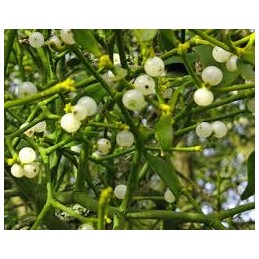
Reference: Jiaogulan
Banner



Mistletoe, also known as the "tree from heaven" or the "plant of love," is a mysterious plant with a centuries-old history of use in natural medicine and mythology. Renowned for its healing properties, mistletoe has become a popular herb in many cultures around the world. This semi-parasitic plant, which derives nutrients from trees, has gained respect for its immune-boosting and infection-fighting abilities. Mistletoe contains a wealth of biologically active substances, including flavonoids, polyphenols, and lignans, which contribute to its beneficial effects on the body. According to ancient beliefs, mistletoe was a symbol of fertility, love, and happiness. It was celebrated during the winter solstice, considered a gift from the gods. Even today, many cultures continue the tradition of hanging mistletoe above doorways as a protective talisman. In medicine, mistletoe is used as a remedy for various ailments, helping the body cope with stress and tension, restoring mental and physical balance, supporting the fight against infections, and antioxidants protect against harmful free radicals.
 Security policy
Security policy
(edit with the Customer Reassurance module)
 Delivery policy
Delivery policy
(edit with the Customer Reassurance module)
 Return policy
Return policy
(edit with the Customer Reassurance module)
 Other names for mistletoe include:
Other names for mistletoe include:
 1. What are the medicinal properties of mistletoe ?
1. What are the medicinal properties of mistletoe ?
Mistletoe, also known as the "semi-parasitic medicinal plant," has many medicinal properties that have been used for many years in traditional medicine. Here are some of them:
 2. Is mistletoe safe for health ?
2. Is mistletoe safe for health ?
Mistletoe is a plant with many health benefits, but like any herb, it can be dangerous in the wrong dose or in certain medical conditions. Therefore, before starting mistletoe treatment, it is always advisable to consult a doctor or herbal specialist. Mistletoe is generally considered safe for healthy adults when used in doses recommended by specialists. However, pregnant women, individuals with heart disease, kidney disease, or liver disease should avoid using mistletoe without consulting a doctor. Some sources suggest that mistletoe may affect blood pressure and cause heart arrhythmias, so individuals with heart problems should be particularly cautious when using mistletoe. Depending on the dosage and method of use, mistletoe can also cause side effects such as diarrhea, nausea, vomiting, dizziness, abdominal pain, headaches, allergic reactions, and others. Therefore, before starting mistletoe treatment, it is essential to carefully analyze any health conditions and issues that the individual using this plant may have and consult a doctor or herbal specialist to assess the potential benefits and risks associated with its use.
 3. What are the ways to use mistletoe ?
3. What are the ways to use mistletoe ?
Mistletoe has many medicinal applications and is used in various forms. The most common way to use mistletoe is as an infusion made from dried leaves and stems. To prepare it, take 2-3 teaspoons of dried mistletoe, pour boiling water over it, and let it steep for 10-15 minutes. This infusion is consumed three times a day, before meals. Another way to use mistletoe is in the form of an extract or oil. Mistletoe extract is often used in the treatment of heart disease and to alleviate menopausal symptoms. Mistletoe oil is frequently used to relieve pain and skin inflammation, as well as to combat respiratory diseases. Mistletoe can also be used externally by preparing an infusion and using it as a compress on affected areas or in baths. In natural medicine, mistletoe is also used as an ingredient in creams, ointments, and other cosmetic products. Before using mistletoe, it is recommended to consult with a doctor or pharmacist, especially during pregnancy, breastfeeding, or when using other medications.
 4. Can mistletoe be used in the treatment of cancer ?
4. Can mistletoe be used in the treatment of cancer ?
European mistletoe, also known as common mistletoe, is a plant whose use in the treatment of cancer is intensively studied. It contains various chemical compounds, including alkaloids, which exhibit anti-cancer activity. Laboratory studies conducted on cancer cells suggest that mistletoe may have inhibitory effects on the growth of certain types of cancers, including breast cancer, colorectal cancer, and pancreatic cancer. However, further clinical research is needed to determine the effectiveness and safety of mistletoe in treating cancer in humans. In some countries, such as Germany and Switzerland, mistletoe is used as a dietary supplement in cancer treatment, especially in combination with conventional treatment methods. In Poland, mistletoe is not recognized as a medicine, and its use in cancer treatment is not recommended. It is essential to note that mistletoe may have side effects and interactions with medications. Therefore, before using mistletoe for cancer treatment, it is important to consult with a doctor.
 5. What are the side effects of using mistletoe ?
5. What are the side effects of using mistletoe ?
Mistletoe is a plant with many medicinal properties, but like most herbal remedies, it may cause side effects. In some cases, the use of mistletoe may lead to adverse effects, such as:
It is important to consult with a doctor before using mistletoe, especially for individuals with gastrointestinal disorders, hypertension, liver or kidney diseases, allergies, and autoimmune diseases. Individuals taking medications on a regular basis should also consult with a doctor, as mistletoe may interact with certain drugs.
 6. Can mistletoe be used in the treatment of heart diseases ?
6. Can mistletoe be used in the treatment of heart diseases ?
Mistletoe is a plant that has been attributed with medicinal properties for centuries. There is scientific research suggesting that mistletoe may have a beneficial impact on heart health. Mistletoe contains compounds such as lignans and flavonoids, which exhibit anti-inflammatory and antioxidant effects. Studies have shown that these compounds may help lower cholesterol levels in the blood and reduce the risk of heart diseases. Additionally, mistletoe contains compounds that may aid in blood pressure regulation, which can have a positive effect on heart health. These compounds have vasodilatory effects, which may improve circulation. Although mistletoe may show promise for heart health, it is essential to consult with a doctor before starting any therapy involving this plant. The effects of mistletoe may interact with other medications, so it should not be used without medical consultation.
In summary, mistletoe may potentially be beneficial for heart health, but always consult with a doctor before starting any therapy involving its use.
 7. Does mistletoe have antiviral properties ?
7. Does mistletoe have antiviral properties ?
Mistletoe is a plant with known medicinal properties for centuries. One of the recent discoveries relates to its antiviral properties. It appears that the substances found in mistletoe may have a positive impact on the body infected with viruses. Studies have shown that mistletoe contains substances called lignans, which possess antiviral properties. In vitro studies have demonstrated that these lignans inhibit the replication of viruses, including the influenza virus and herpes virus. This discovery could be significant in the field of medicine, especially in the fight against viruses that are challenging to treat with conventional methods. However, it is important to note that research on mistletoe's antiviral properties is still in the experimental phase, and its effectiveness in treating viral diseases in humans has not been fully confirmed yet. Therefore, before using mistletoe to combat viral diseases, it is essential to consult with a doctor and conduct appropriate research.
 8. Can mistletoe be used in the treatment of autoimmune diseases ?
8. Can mistletoe be used in the treatment of autoimmune diseases ?
Mistletoe has a long history of use in traditional medicine for treating various diseases, including autoimmune diseases. Although research on this topic is limited, some laboratory studies suggest that mistletoe may have a beneficial impact on the immune system. Some studies have shown that mistletoe can inhibit the activity of T lymphocytes, which are key immune cells involved in autoimmune diseases such as systemic lupus erythematosus or multiple sclerosis. However, most of these studies were conducted on animals, and data from clinical trials in humans are limited. Due to the lack of sufficient clinical studies, mistletoe should not be considered as the primary treatment for autoimmune diseases. Individuals with such conditions should consult a doctor before starting any treatment involving mistletoe preparations. In any case, before using mistletoe as a dietary supplement, it is essential to consult a doctor or pharmacist, especially if the person has any chronic diseases, takes prescription medications, or is pregnant or breastfeeding.
 9. Can mistletoe be used to improve the body's immunity ?
9. Can mistletoe be used to improve the body's immunity ?
Mistletoe is a plant with broad medicinal properties, including its ability to stimulate the body's immune system. These properties stem from the presence of various chemical compounds in mistletoe, including polyphenols, flavonoids, and lignans. Studies show that mistletoe can support the immune system by increasing the number and activity of lymphocytes, which are crucial for the functioning of the immune system. In this way, mistletoe can help combat infectious diseases such as the flu or the common cold. However, to improve immunity, mistletoe should be used in moderation and always after consulting with a doctor. The recommended dosage and duration of use should not be exceeded, as excessive consumption of mistletoe may lead to side effects such as diarrhea or nausea. It is also essential to remember that mistletoe can interact with some medications, so it is important to consult a doctor before starting supplementation.
 10. What are the contraindications for using mistletoe ?
10. What are the contraindications for using mistletoe ?
Mistletoe is a plant that can bring many health benefits, but like any medication or herb, it has contraindications for use. First and foremost, mistletoe should not be used by individuals allergic to this plant, as it can lead to serious allergic reactions. People with heart disease, diabetes, kidney diseases, hypertension, and other serious conditions should consult a doctor before using mistletoe, as it may have a negative impact on their health. Additionally, mistletoe is contraindicated for pregnant women and breastfeeding mothers, as it can affect hormone levels and lead to abnormal fetal development or impact the quality of breast milk. Other contraindications for using mistletoe include autoimmune diseases, gastrointestinal disorders, thyroid diseases, mental illnesses, and the use of certain medications, such as anticoagulants, antihypertensive drugs, and some psychotropic medications. It is essential to consult a doctor before starting mistletoe use, especially if the person has any medical conditions or takes any medications. Regardless of whether the person is using mistletoe as an herb, extract, or supplement, caution should be exercised, and it is crucial to follow the recommendations of a doctor or pharmacist.
 SCIENTIFIC RESEARCH has been conducted, among others, by:
SCIENTIFIC RESEARCH has been conducted, among others, by:
 STORAGE
STORAGE
Mistletoe, like many other herbs, requires proper storage to preserve its medicinal properties for as long as possible. To ensure the long-lasting quality of mistletoe, several basic storage principles should be followed. First and foremost, mistletoe should be stored in a dry and cool place, preferably in a closed container or paper/mesh bag. Humid and warm air can lead to mold growth and spoil the herb, as well as cause a loss of its medicinal properties. It is also essential to keep mistletoe away from sources of light and heat, such as stoves or radiators. Additionally, mistletoe should be stored separately from other herbs and food products, as it may undergo chemical reactions with other ingredients and lose its medicinal properties. If you have mistletoe in the form of a tincture, it should be stored in a dark place at room temperature or in the refrigerator. The tincture should be kept in a dark glass bottle to protect it from light.
If you want to store fresh mistletoe, you need to dry it thoroughly first. This can be done by spreading mistletoe in a thin layer on paper or using a specialized herb dryer. Once dried, mistletoe can be stored in a jar or container. It is also important to regularly check the expiration date of mistletoe and its appearance to ensure it is still suitable for use. If there are any signs of spoilage, such as an unpleasant smell or mold, the mistletoe should be discarded immediately. Following these simple storage guidelines will help maintain mistletoe in its best condition and ensure its long shelf life.
 SCIENTIFIC SOURCES
SCIENTIFIC SOURCES

Thank you for your interest in our website dedicated to herbs! We appreciate that you value our work and effort we put into creating valuable content. If you would like to share our information on your website, we warmly encourage you to do so. However, please respect our copyrights and do not copy the content without our permission.
If you wish to share our website, you can always provide a link that leads to our page. This not only helps maintain the integrity of our work but also allows your readers to discover more valuable information about herbs.
Thank you for your understanding and support! If you have any questions or need additional information, please do not hesitate to contact us. We are always here to assist you.
Reference: Jiaogulan
Reference: red sage
Reference: green tea
Reference: Ashwagandha
Reference: Barbados cherry acerola
Reference: ginger
Reference: Catuaba / Erythroxylum catuaba / Trichilia catigua
Reference: Arjuna (Terminalia arjuna)
Your review appreciation cannot be sent
Report comment
Report sent
Your report cannot be sent
Write your review
Review sent
Your review cannot be sent

Mistletoe, also known as the "tree from heaven" or the "plant of love," is a mysterious plant with a centuries-old history of use in natural medicine and mythology. Renowned for its healing properties, mistletoe has become a popular herb in many cultures around the world. This semi-parasitic plant, which derives nutrients from trees, has gained respect for its immune-boosting and infection-fighting abilities. Mistletoe contains a wealth of biologically active substances, including flavonoids, polyphenols, and lignans, which contribute to its beneficial effects on the body. According to ancient beliefs, mistletoe was a symbol of fertility, love, and happiness. It was celebrated during the winter solstice, considered a gift from the gods. Even today, many cultures continue the tradition of hanging mistletoe above doorways as a protective talisman. In medicine, mistletoe is used as a remedy for various ailments, helping the body cope with stress and tension, restoring mental and physical balance, supporting the fight against infections, and antioxidants protect against harmful free radicals.